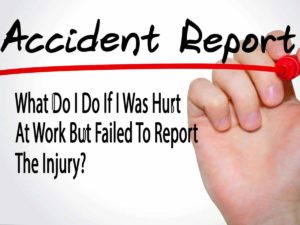What Do I Do If I Was Hurt At Work But Failed To Report the Injury
Introduction to What Do I Do If I Was Hurt At Work But Failed To Report the Injury
Importance of Reporting Workplace Injuries

What Do I Do If I Was Hurt At Work But Failed To Report the Injury
When you get hurt at work, it's crucial to report the injury right away. Telling your employer about your injury helps keep you and your coworkers safe because it makes sure any dangerous situations get fixed. Plus, reporting your injury promptly can also help you receive the benefits and medical care you need.
Consequences of Failing to Report an Injury
If you don't report your workplace injury, you might face some problems. For example, you could miss out on getting workers' compensation benefits or have trouble proving your injury happened at work. In some cases, your employer might even question whether you were really injured on the job. That's why it's essential to report any workplace injuries as soon as possible.
Steps to Take After Failing to Report a Workplace Injury

Steps to Take After Failing to Report a Workplace Injury
Gather Evidence
Medical Records: If you didn't report your injury right away, start by collecting your medical records. These records can show that your injury is real and help explain how it happened.
Witness Statements: Next, talk to your coworkers who saw your accident. Ask them to write down what they saw and sign their statements. Witness accounts can help support your case.
Photographs: Take photos of the place where you got hurt and any visible injuries you have. Pictures can provide strong evidence and help prove your injury happened at work.
Inform Your Employer
Explain the Circumstances: Once you have your evidence, talk to your boss about your injury. Be honest about why you didn't report it earlier, and explain what happened.

Photographs of Work Injury For Reporting
Provide Evidence: Show your employer the evidence you collected, like your medical records, witness statements, and photographs. This information can help them understand your situation better.
Consult an Attorney
Understand Your Legal Rights: After talking to your employer, it's a good idea to speak with a lawyer who specializes in workplace injuries. They can explain your rights and help you figure out your next steps.
Assess the Strength of Your Case: Your attorney can look at the evidence you've gathered and give you an idea of how strong your case is. They can also guide you on what to do next to get the help and compensation you need.
Consider Filing an Appeal of Denied Claim: Your employer could deny your claim. But, you can file an appeal at the Workers' Compensation Appeals Board. A judge will hear your case and decide on your credibility.
Consider Filing a Cumulative Trauma Claim: Cumulative Trauma claims happen over time. The reporting of this type of claim is relaxed.
Workers' Compensation No-Fault System

Importance of Reporting Workplace Injuries
The Role of Workers' Compensation
What Do I Do If I Was Hurt At Work But Failed To Report the Injury – Workers' compensation is a type of insurance that helps people who get hurt at work. It can pay for things like medical bills, lost wages, and even job retraining if you can't do your old job anymore. Most employers must have workers' compensation insurance to protect their employees.
Late Reporting and Its Effect on Your Claim
When you report your injury late, it can cause problems with your workers' compensation claim. For example, the insurance company might question whether your injury happened at work or if you're really hurt. Late reporting can also make it harder to prove your case and receive the benefits you need. In some cases, waiting too long might mean you won't be able to get any help from workers' compensation at all. That's why it's so important to report your injury as soon as possible.
Examples of Hurt at Work Cases

Successful Claim After Late Reporting
Successful Claim After Late Reporting
Imagine a worker named Sarah who slipped and hurt her back while lifting a heavy box at work. She didn't report the injury right away because she thought it wasn't a big deal. But after a week, her pain got much worse. Sarah gathered evidence, like medical records and witness statements, then told her boss about the injury. With the help of a lawyer, Sarah was able to prove her case and received workers' compensation benefits, even though she reported the injury late.
Unsuccessful Claim Due to Late Reporting
Now, picture a worker named John who also hurt his back at work. He didn't report the injury and waited for several months before telling his boss. By that time, John didn't have any evidence or witnesses to support his claim. The workers' compensation insurance company questioned whether his injury happened at work and denied his claim. Unfortunately, John missed out on the benefits he needed because he reported his injury too late.
Conclusion to What Do I Do If I Was Hurt At Work But Failed To Report the Injury
Importance of Timely Reporting
Reporting your workplace injury as soon as it happens is very important. When you report it quickly, you have a better chance of getting the help and benefits you need from workers' compensation. It also helps make sure your employer fixes any dangerous situations to keep everyone safe at work.

Possible Options for Those Who Failed to Report Promptly
Possible Options for Those Who Failed to Report Promptly
If you didn't report your injury right away, don't worry—there might still be options for you. Start by gathering evidence, like medical records, witness statements, and photographs. Then, talk to your boss about your injury and show them the evidence. Finally, speak with a workers' compensation lawyer who can help you understand your rights and guide you through the process. Remember, it's always better to report your injury as soon as you can, but if you didn't, taking these steps might still help you get the support you need.
Napolin is A Workers' Compensation Lawyer Fighting For Injured Workers in California
At Napolin Law Firm, we understand that reporting a workplace injury late can be a challenge, but we're here to help you navigate through the process. Our experienced attorneys will work tirelessly to gather evidence and build a strong case for your workers' compensation claim. We have a proven track record of assisting clients with late-reported injuries, and we're not afraid to file appeals at the Workers' Compensation Appeals Board (WCAB) in California if necessary. Don't give up; with Napolin Law Firm by your side, you'll have the support and expertise needed to fight for the compensation you deserve.
- Safely and Legally Navigating Parking Lots in California - July 15, 2024
- Navigating the Aftermath of a Highway Auto Accident in California - July 15, 2024
- An Overview of California's Commercial Truck Insurance Laws - July 15, 2024
